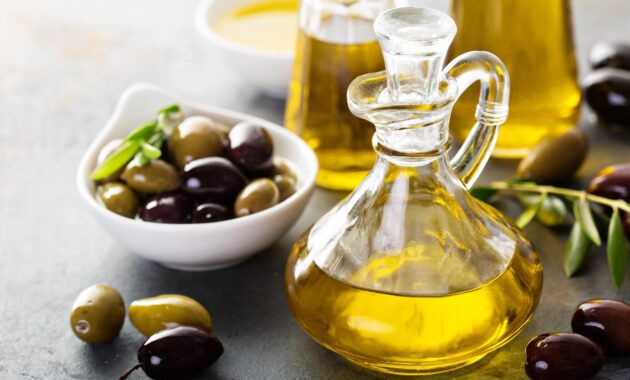Selecting the right cooking oil is crucial for both taste and health. Olive oil stands out as a choice due to its heart-healthy monounsaturated fats and antioxidants. It is, however, ideal for cooking only at low to medium heat because of its rich flavour and nutritional content. There are several types of olive oils that can be used for different methods of cooking. Hence, you should also be informed of the appropriate type to use before using olive oil.
Types of olive oils for cooking
Here are 5 types of olive oils that can be used for cooking. Also, learn which type is best for you:
1. Extra-virgin olive oil
Extra-virgin olive oil is regarded as the highest quality, produced by pressing olives without any chemical processing. It boasts a rich flavour, low acidity and a vibrant green colour. It is perfect for giving a finishing touch to cooked dishes and drizzling over salads due to its powerful flavour and enticing aroma. It works best for low to medium-heat cooking methods like sautéing or light frying because of its low smoke point.

2. Virgin-olive oil
Similar to the extra-virgin variety, virgin olive oil is also extracted without the use of chemicals but may have a slightly higher acidity level. Since it has a milder flavour profile than extra-virgin, it is appropriate for meals where you want the flavor of olive oil but not an overpowering one. Virgin olive oil can be used to sauté vegetables over medium heat, bake, and marinate foods.
3. Refined olive oil
The process of refining olive oil removes contaminants and lessens acidity. Compared to extra-virgin and virgin olive oils, this yields a more neutral flavor and a higher smoke point. Refined olive oil can be used for deep-frying, frying and other high-heat cooking methods since it can handle higher temperatures. It’s a fantastic alternative for recipes when you don’t want the olive oil flavour to dominate, such as in some baked goods.

4. Pure olive oil
Pure olive oil, often referred to as light or classic olive oil, is a blend of refined olive oil and a small amount of extra-virgin or virgin olive oil. This mixture seeks to strike a balance between a milder flavour and a greater smoke point. It’s a versatile choice for regular cooking, such as grilling, roasting and stir-frying, where the flavour of the olive oil won’t overpower the food. But keep in mind that the refining method used to produce this oil may potentially speed up the degradation of antioxidants and other healthy ingredients in olive oil. It is therefore less healthy than extra virgin olive oil.
5. Olive pomace oil
Olive pomace oil is the most processed type of olive oil and is produced by pressing olives and then extracting them using heat and solvents. It is suited for high-temperature cooking and frying because of its higher smoke point and bland flavor. However, it lacks the distinctive characteristics of extra-virgin or virgin olive oil, which may limit its use in dishes where the olive oil’s flavour is a significant component.
Is using olive oil beneficial?
Due to its antioxidants and heart-healthy monounsaturated fats, cooking with olive oil has many advantages. The best olive oil for cooking is often considered to be extra virgin. It is suited for low to medium-heat cooking methods like sautéing and light frying because of its rich flavor, low acidity, and nutritional content. However, due to their higher smoke values, refined or pure olive oil may be more suitable for high-heat cooking. Using olive oil in your cooking can improve the flavor and nutritional content of your meals.

Tips to use olive oil
Incorporating these different types of olive oil into your cooking can greatly enhance the flavor and quality of your dishes. Here are some tips to make the most of each type:
- For salad dressings, dipping sauces, or drizzling over finished dishes, choose the premium flavors of extra-virgin olive oil.
- When baking, sautéing, or making delicate sauces, use virgin olive oil to add a delicate olive flavor.
- You should always use refined olive oil for frying, deep-frying, and high-heat cooking due to its high smoke point.
- Pure olive oil strikes a balance between mild flavor and a higher smoke point, making it versatile for various cooking methods.
- For foods that must be cooked at high temperatures, like those that require deep-frying or searing, olive pomace oil is ideal.
So, you now know what kind of cooking calls for what kind of olive oil. Try it now!
#Types #olive #oils #health #benefits
